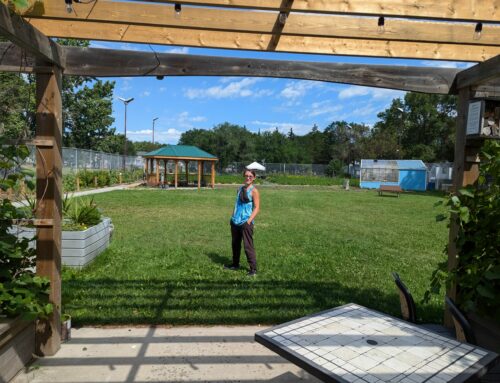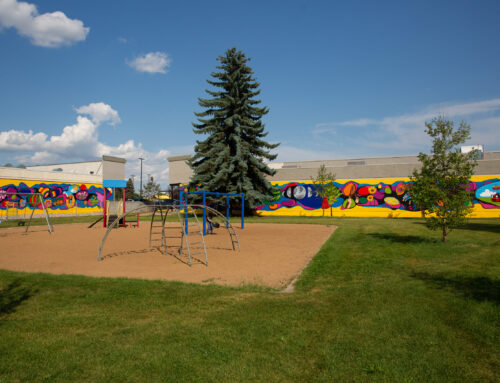Images courtesy of Delton Community League.
The bigger the problem, the harder to know where to begin. Before you try to take your first step, though, it might help to extend your hand.
Having recently retired, Delton’s Gail Silvius knew she wasn’t going to be content to just idle. Having a long and increasing awareness of environmental issues, she had mulled and considered a few potential actions when she came across the City of Edmonton’s Neighbouring for Climate initiative. Though it spoke immediately to her desire to work for the climate, it was the neighbouring part that really did it for her: as someone who’s proud to say she knows everyone on the block, it was the chance to bring people together for change that really got her (electric) engine running.
 “There are lots of things you can do, sure. Like, maybe I could sell my car and ride the bus — but then where am I? I’m just on the bus, alone,” Silvius, pictured here with Delton gardener Esther Pratt, explains. “If I am stressing individually about the environment, on my own I’m just going to fall into despair.”
“There are lots of things you can do, sure. Like, maybe I could sell my car and ride the bus — but then where am I? I’m just on the bus, alone,” Silvius, pictured here with Delton gardener Esther Pratt, explains. “If I am stressing individually about the environment, on my own I’m just going to fall into despair.”
So, armed with the City’s suggestions as a starting point, Silvius checked in with her Community League — “I’m the type where, if no one says no, I’m just going to keep going,” she notes — and got their blessing to put a call-out in the Rat Creek Press. That was all it took to get Green Delton, as the group has come to be known, off and running. Committed to helping showcase and spread attainable climate actions throughout the central Edmonton neighbourhood, they’re finding that getting people together and living greener can make both better.
 “People want to be part of their community and to know their neighbours have their backs,” says Mark Stumpf-Allen, pictured getting his hands dirty, who took Gail up on her offer to get together shortly after reading her article. “Knowing we share the same fears and dreams about the future helps us cope with uncertainty. It’s a bit like going back to Kindergarten, creating a safe space to learn to take baby steps. That’s what I hope Green Delton becomes — a way to get everyone doing climate action imperfectly.”
“People want to be part of their community and to know their neighbours have their backs,” says Mark Stumpf-Allen, pictured getting his hands dirty, who took Gail up on her offer to get together shortly after reading her article. “Knowing we share the same fears and dreams about the future helps us cope with uncertainty. It’s a bit like going back to Kindergarten, creating a safe space to learn to take baby steps. That’s what I hope Green Delton becomes — a way to get everyone doing climate action imperfectly.”
The goal might be imperfect action, but the group had a nearly ideal start, from a community-building point of view. Though the individual members have plenty of experience between them — Stumpf-Allen, for instance, was the City of Edmonton’s Compost Programs Coordinator for more than a decade — they knew that getting people actually invested in doing something about climate couldn’t be a top-down affair. Their first act, after meeting, wasn’t to plan programming, but to ask people what they actually wanted to learn about — using, it must be pointed out, a clever, eye-catching and thematically appropriate voting system involving dropping seeds into garden pots.
“We did some excellent visioning but quickly realized that we couldn’t begin to work towards those lofty goals without doing some basic field work,” explains Stump-Allen. “We knew we needed to put our neighbours in charge.”
“You have to start where people are at,” echoes Silvius. “There’s enough going on with these issues that we didn’t need to bring anything new, we just needed to talk to the people in our neighbourhood and find out what was important to them.”
The dividends of this investment in the community have already started to pay off. Green Delton began programming in the new year, using the community’s suggestions as a guide. A lot of seeds ended up in pots related to gardening and yard care, so that’s where they’ve begun. Their first workshop covered the basics of gardening, while March’s focuses on how to attract pollinators to the neighbourhood, with two more, this year at least, diving into composting and creating a regenerative lawn.
According to Silvius, each workshop’s attendance has doubled, helped along not only by the topics, but the format: they run each one twice, on Tuesday evening and Saturday afternoon of the same week, to help bring out people with varied schedules (though more than a few have attended a Tuesday session only to come back Saturday, with more questions).
 Green Delton will try to combine both those people and what they’ve learned when they make space for the city’s pop-up garden program this summer. Then, it’s back to the drawing board — and voting pots — as they figure out the next steps.
Green Delton will try to combine both those people and what they’ve learned when they make space for the city’s pop-up garden program this summer. Then, it’s back to the drawing board — and voting pots — as they figure out the next steps.
Neither Stumpf-Allen nor Silvius could predict exactly what those steps might be, but they do know they’ll involve climate action, community and collaboration — and lots of it.
“Where else but at the community level do we get actionable advice that doesn’t try to sell a product?” asks Stumpf-Allen. “In today’s world we are connected to everyone and everything and yet we’re missing the basic connections to community and to nature. A healthy life can’t be bought, it is built from materials at hand, informed by wisdom and understanding.”
“We’d like to attract some more people to come and do some stuff, and we’d like people to feel comfortable and welcomed,” says Silvius matter-of-factly. “It’s about doing stuff, but it’s about coming together to do some stuff. If we get to know each other just because we’re gardening together, well — that’s an organic connection, isn’t it? And that will take you pretty far.




